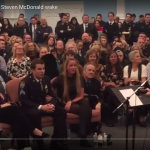Much is being written and said about Pope Francis’s comments during an interview published yesterday in several Jesuit magazines, including “America.” Of course, everyone’s interpretation is filtered through their own beliefs and biases, so unless you read what the Pope said in context and in its entirety (much like the way you’re supposed to read the Bible), you won’t be getting the full story.
For instance, if mainstream media reports are giving you the impression that the Pope will soon be opening Vatican-approved abortion clinics, you’ve been severely misled.
Personally, I think much of what the Pope said needs to be interpreted through the lens of one particular interview passage. He said, ““I see clearly…that the thing the church needs most today is the ability to heal wounds and to warm the hearts of the faithful; it needs nearness, proximity. I see the church as a field hospital after battle. It is useless to ask a seriously injured person if he has high cholesterol and about the level of his blood sugars! You have to heal his wounds. Then we can talk about everything else. Heal the wounds, heal the wounds…. And you have to start from the ground up.”
The Pope is basically saying that Catholics – be they clergy, religious or laypeople – need to meet people where they are. He’s not saying to leave them where they are – or, using his own example, to ignore their high cholesterol and high blood sugar level. Rather, there’s an order to follow. Treat the sucking chest wound first before you encourage a lowfat diet.
Consider a cake recipe as another example. Usually you start by mixing flour, sugar, water, eggs, etc. Then you put the batter in the cake pan and bake it. You can’t put dry flour in the pan by itself, stick it in the oven and expect to come out with a cake.
In the same way, you can’t expect to reach people who are unchurched or who have been poorly evangelized and catechized to understand where the Church is coming from on controversial issues if they don’t have a solid foundation of experience and understanding. It’s really about doing your best to become a personal example of holiness, and seeing that example bear fruit in relation to others. Let me give three examples.
1. When I interviewed best-selling author and Catholic convert Dean Koontz several years ago, he said that one of the reasons he joined the Church was because of its wonderful intellectual traditions. But the first thing that drew him to the Church was the example of good Catholic people. His acceptance of theology and doctrines came later; the first step was the personal touch, a living example of Jesus’s love, mercy and kindness.
2. In a Letter to the Editor of Catholic Digest, Shannon Hageman described how her life changed forever after hearing the words, “I understand,” from Father Jerel Scholl. The Yutan, Nebraska woman explained, “Those were the words Father Jerel used in response to my excuses for my rare attendance at Mass…That’s exactly what I needed to hear. I needed a spiritual father who understood. From the first time I heard his homily, the wall I’d put up between myself and the Church slowly began to crumble…Father Scholl and I crossed paths at a pivotal point in my life. I’d experienced great loss and I found myself in a hopeless pit of despair. Somehow, I knew my happiness depended on loving a God I felt so unloved by…My attendance at Mass slowly improved. For the first time, I was perceptive of homilies, more aware of the liturgy, and stumbling into prayerful conversations with Christ…I didn’t know how to love God, and with Father Scholl, I learned that you cannot love someone you do not know. Father Scholl taught me to know God. Nothing can change a life quite like that.”
3. Another example of the importance of personal holiness came out in an interview I did with Mother Agnes Mary Donovan, one of the foundresses of the Sisters of Life, who care for women in crisis pregnancies so they choose to have their babies instead of an abortion. When I asked her about how she deals with the topic of abortion, which stirs up a lot of anger, she offered this prescription for the negativity – “We’ve found that the simple alchemy of love – loving those that come to us one heart at a time – that is what changes them…(Some) that come to us tell us they are pro-choice; that’s no issue to us. Oftentimes as they’re with us…and we’ve loved them, something will emerge where they’ll say ‘I could never think that again.’…What we see is abortion and those kinds of decisions are fueled by fear. St. John says, ‘Perfect love casts out fear.’ When one is supported and surrounded by love, they see the world and themselves differently.”
What the Pope appears to be doing is issuing a call to holiness to all of us to be leaven in the world, to treat all people as if they were created in the image and likeness of God. That doesn’t suggest an easy, simplistic, just-be-nice philosophy. It calls for wisdom, tact, self-control, patience, compassion, faith, trust, perseverance and the willingness to lovingly challenge a person’s way of thinking and acting. Living those virtues is most definitely not easy.
What’s easy is getting angry at people who disagree with us, losing our temper, and telling them how wrong they are. That’s the way of the world, and I know it’s easy because I’m inclined to act that way myself. But if you want to follow the way of the gospel and the way of the cross, gird your loins because you’re in for a challenge.
Pope Francis isn’t cutting anything out of the Church’s teaching; he’s just suggesting a more holistic approach. People with a particular ideology to push will twist that into whatever they want it to mean. But if you really want to know what the Pope’s words mean, just keep watching his actions. In the end, that’s what counts the most.












